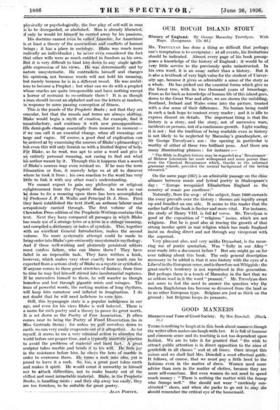OUR ROUGH ISLAND STORY
Ma. TREVELYAN has done a thing so difficult that perhaps one's temptation is to overpraise : at all events, his limitations' should be indicated. Almost every page of his book presup- poses a knowledge of the history of England : it would be of very little service to the previously quite uninstructed. In his own word, it is an essay rather than a history. But it is also a textbook of very high value for the student of Univer- sity age, because it gives so admirably a sense of the story as a whole. He has picked out the essential forms which give us the forest tree, with its two thousand years of branchage. Froni as far back as knowledge of human life of this island goes, down to the Great War and after, we arc shown the unfolding. Scotland, Ireland and Wales come into the picture, treated with a due sense of their difference. No human being could in such a task hope to content every reader ; and it is idle to express dissent on details. The important thing is that the history is a story, and the story,' not of successive wars, incidents or persons, but of a continuous growth. Light reading it is not ; but the tradition of being readable even in history, is not likely to be neglected by Macaulay's grandnephew, or Sir George Trevelyan's son : the opening in particular is worthy of either of these two brilliant pens. And there are many illuminating phrases : for instance :- " The Bible in English history may be regarded as a ' Renaissance ' of Hebrew Literature far more widespread and more potent than even the Classical Renaissance which, thanks to the reformed grammar schools, provided the mental background of the bettep educated."
On the same page (367) is an admirable passage on the close alliance between music and lyrical poetry in Shakespeare's day : " Europe recogiiiied Eliiabethan England ' as the country of music par excellence."
Naturally, from the scop of the subject, from 1600 onwards the essay prevails over the history : themes ale raPidly swept up and bundled on one side. It seems to this reader that the earlier half of the book is fresher and more vital. For instance, the study of Henry VIII. is full *if verve. Mr. Trevelyan is good at the exposition of " religious " issues, which are not religious. But he is good also at tracing the growth of that strong insular spirit in real religion which has made England insist on dealing direct and not through any vicegerent with the supernal.
Very pleasant also, and very unlike Dryasdust, is the recur- ring use of poetic quotation. Was " Sally in our Alley " ever made into a document before ? But one might go on for ever talking about this book. The only general description necessary to be added is that it sees history with the eyes of a Liberal in the European sense, and is therefore not Whiggish : the great-uncles tendency is not reproduced in this generation. But perhaps there is a touch of Macaulay in the fact that we so seldom read in it the word " peasant." Mr. Trevelyan does not seem to feel the need to answer the question why the modern Englishman has become so divorced from the land as in no other European type. Belgians are just as thick on the ground : but Belgium keeps its peasants.










































 Previous page
Previous page